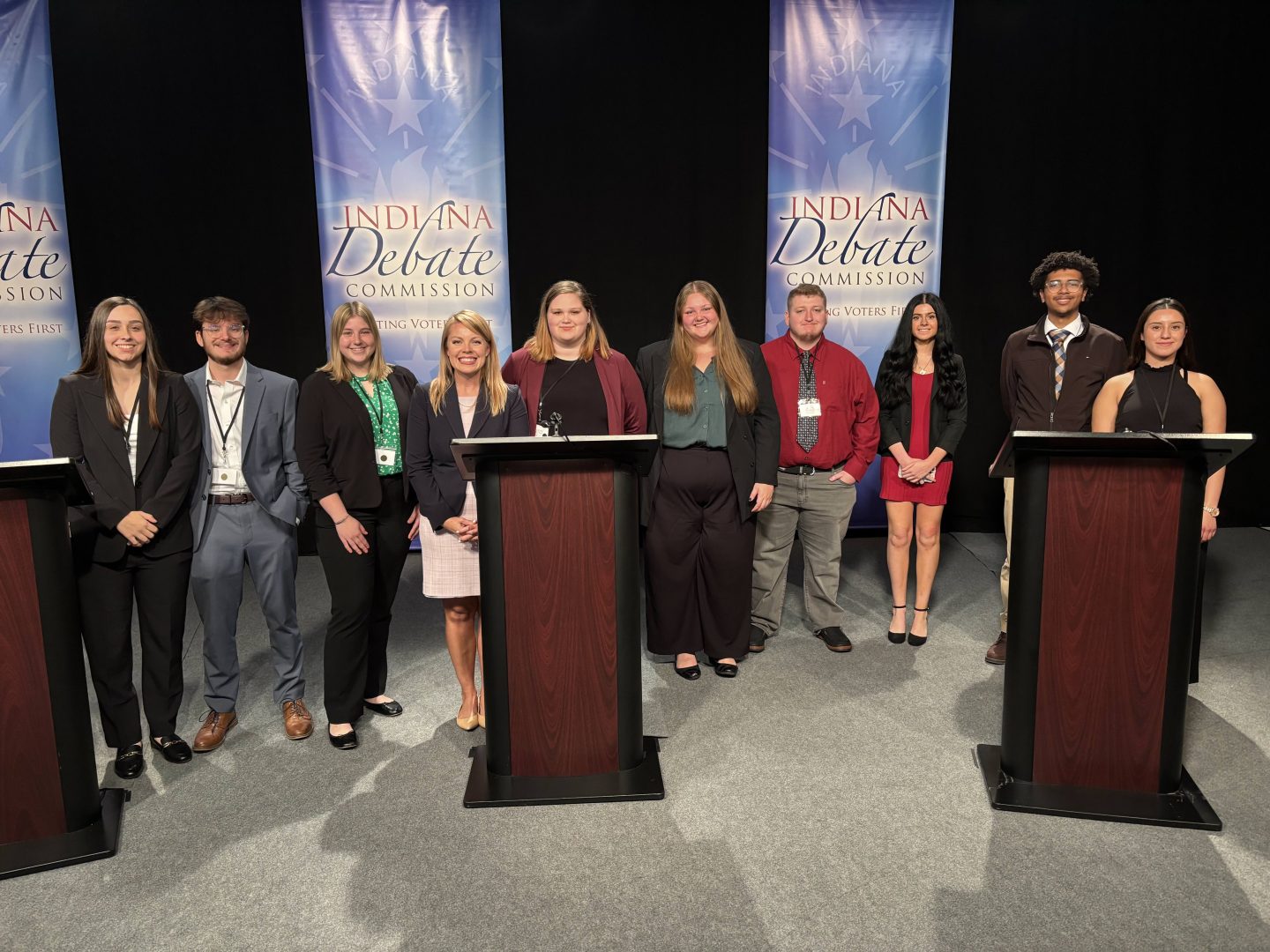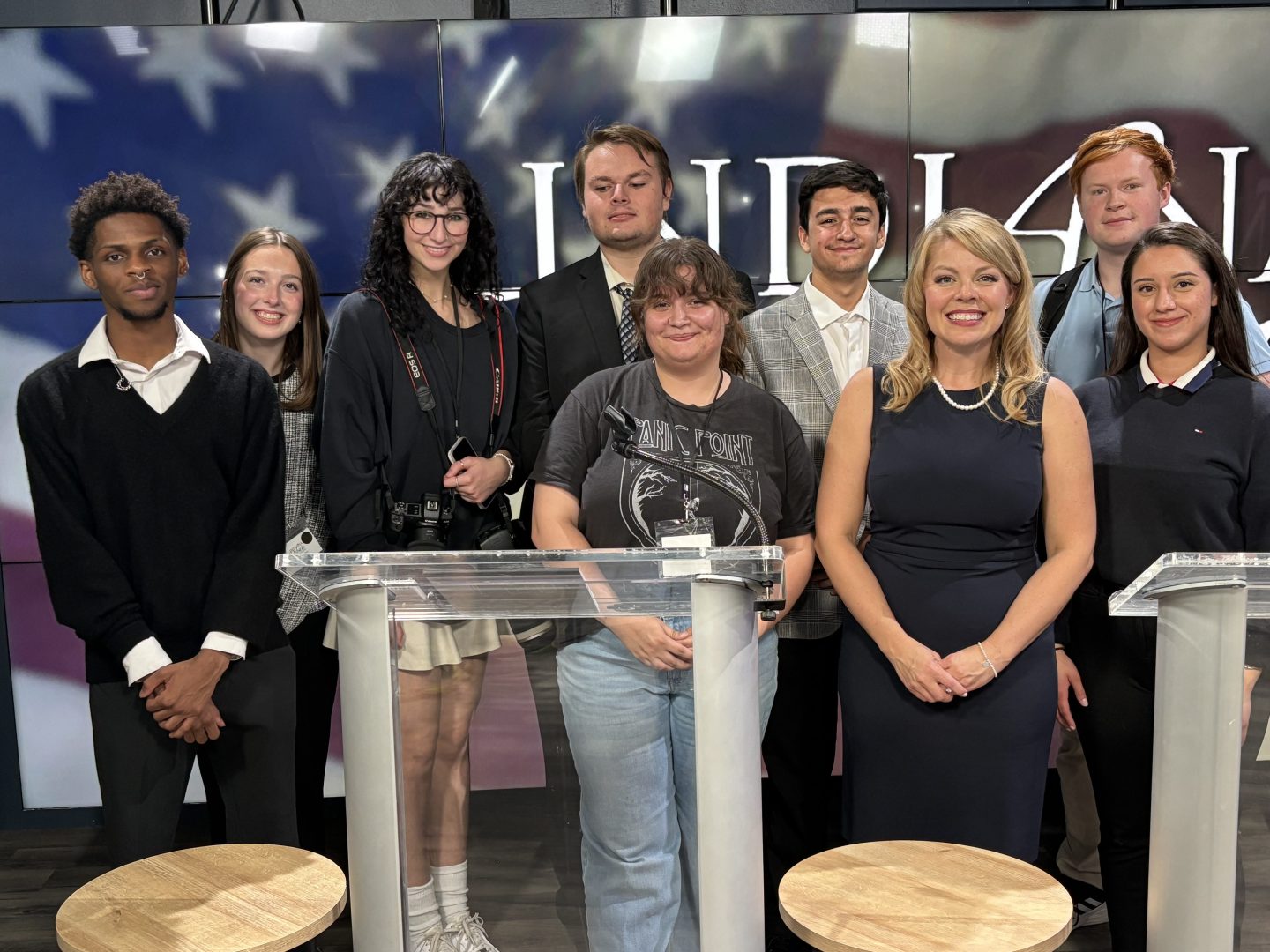
In the busy weeks before the election, UIndy Associate Professor of Political Science Laura Merrifield Wilson found time to moderate Indiana’s gubernatorial and senatorial debates.
Wilson is a decade-long political science professor at UIndy, part of “IN Focus,” an Emmy award-winning, political television show, airs a radio show on WICR titled “Positively Politics,” participates in the UIndy TV production “Policy Matters,” writes an op-ed every other month for the “Indiana Capital Chronicle,” is a member of the League of Women Voters and a board member of the Indiana Debate Commission. If one could not tell already, Wilson enjoys politics. These two recent debates were the fourth and fifth she has moderated over the years.
“The first time I was asked to do debate moderating, I had two in 2016,” Wilson said. “The high-profile one was the gubernatorial race that’s televised. We partner with CSPAN, so it’s nationally available. That is a really big deal.”
The IDC is a non-profit organization that is the longest serving, independent and non-partisan commission of its kind and one of only four state-level debate commissions in the nation. It was founded in 2007 and has conducted 24 gubernatorial and senatorial debates since 2008. The IDC receives all debate questions from the public at large because the goal is to “exist for the voters,” according to its website.
“My job is to cultivate conversations where we rely on questions that come from the voters,” Wilson said. “I have the privilege but also the responsibility of being the voice of the voter and to ask those questions and also hold the candidates accountable to their answers.”
Wilson said a large part of being a moderator is ensuring that all candidates involved are allotted equal amounts of time to answer and opportunities for rebuttal. She said it is in the nature of moderating to be able to think on your feet.
“You have to make a gametime decision and you are live on television and radio,” Wilson said. “You have to prepare and think through what you are going to do if it comes to a specific circumstance. Then you don’t have to panic in the moment without having prepared for it beforehand.”
Wilson said that if things start to get chaotic or the candidates start to become argumentative, she has to stay calm. She said being able to recover from a bad moment is also important.
“You do not have to be liked,” Wilson said. “But you do want to do a good job and be seen as fair to everyone. If you have a bad moment, recover. There is always the next question. It is hard sometimes, but maintaining your composure, being flexible and always thinking a couple of steps ahead is probably the best thing you can do.”
For this year’s Indiana Senatorial Debate, then-Republican Candidate Jim Banks declined to participate. Banks is a congressional representative for the 3rd congressional district in Indiana. The two candidates present were Democrat Valerie McCray and Libertarian Andrew Horning.
Wilson said this was not a surprise to her or the IDC, as the IDC was in contact with Banks’ team through the planning stage. She said it was regrettable for voters that Banks chose not to be present.

“It is unfortunate for the voters because putting a debate on is an opportunity for the candidates to reach out to voters,” Wilson said. “But it is also for the voters to hear from the candidates. When you have a candidate choose not to participate, you are missing an opportunity to have a connection between candidates and voters.”
Wilson said the gubernatorial debate went fantastically, giving her own performance an A-minus because, to her, there is always room for improvement. She said she was happy with the candidates, the timing, the television coverage and the questions from voters.
Wilson said she gave her own performance a B-minus for the senatorial debate, mostly due to the fact that the teleprompter malfunctioned and it caused her to stumble over a few words. She said the candidates, timing and production features — with the exception of the broken teleprompter — were great.
Wilson said her favorite part of moderating debates is the opportunity to connect her students with the experience. She said she loves showing them behind the scenes and giving them the opportunity to meet the candidates.
“I hope I am mentoring the next generation,” Wilson said. “I tell my students, ‘The next time you are on this debate stage, you might be the candidate, the campaign manager or the moderator.’ This might be their first experience, but it probably will not be their last.”







